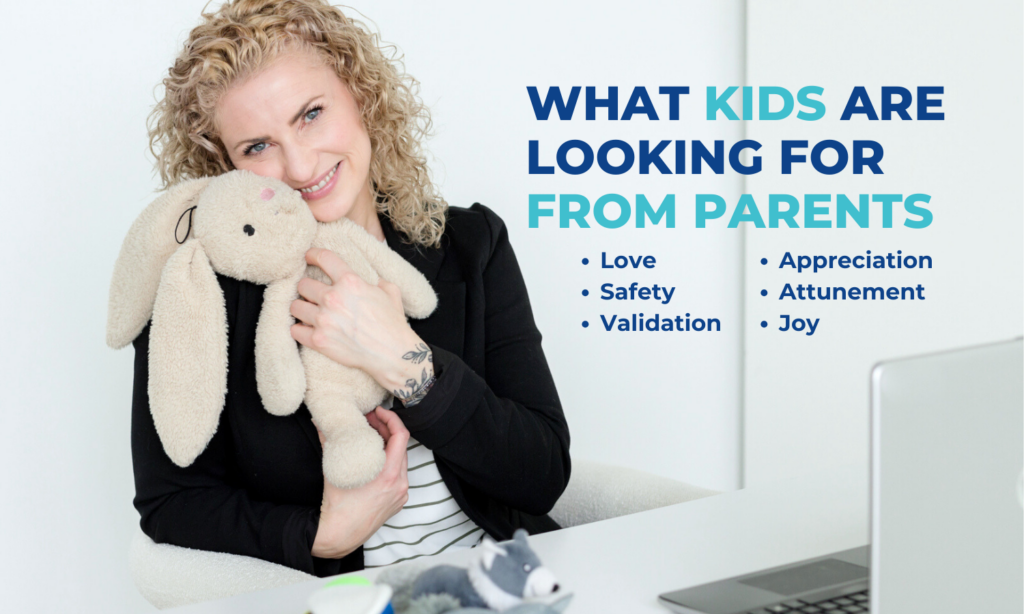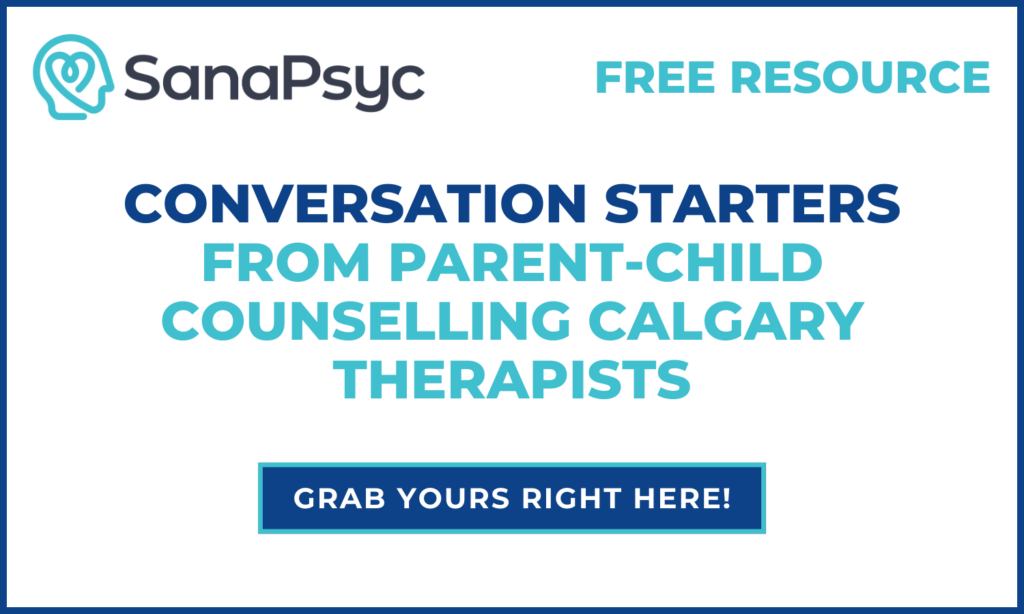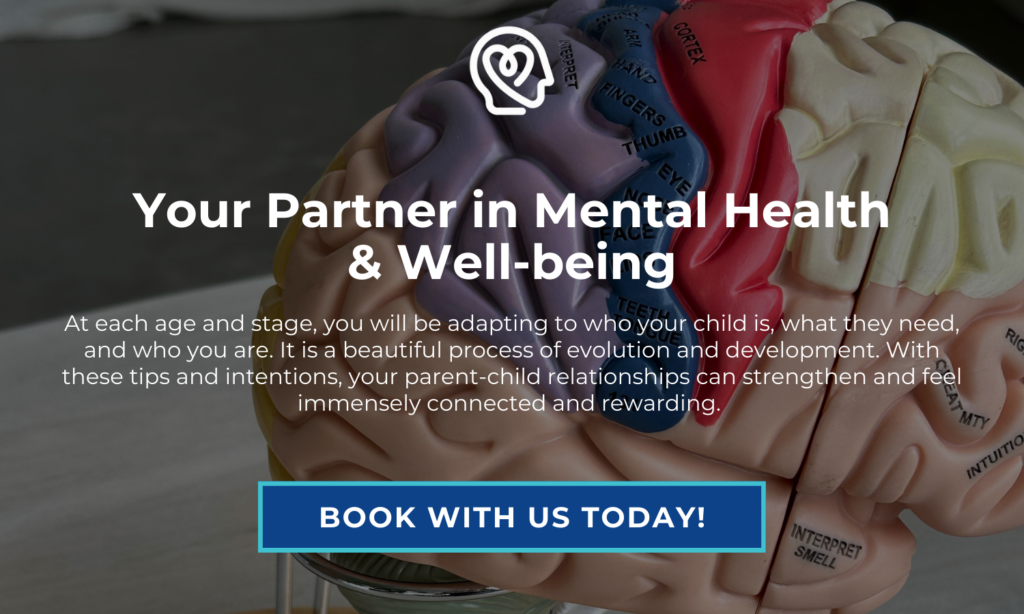Parent-Child relationships are complex and constantly evolving as the people grow and change. These are some of the most integral relationships in our lives, yet often we don’t spend much time focusing on what can strengthen them and make them better until issues arise.
What Kids are Looking for From Parents According to Parent-Child Counselling Calgary Therapists
It may feel confusing as a parent to try and figure out exactly what your child needs. In our experience, parents are often overthinking things. Pull it back to basics and focus on the essentials for establishing a healthy, secure relationship:
- Love (knowing they are appreciated and cared for unconditionally)
- Safety (having the basics of life plus emotional and physical safety provided)
- Validation (being heard and listened to)
- Appreciation (feeling respected and valued)
- Attunement (being paid attention to)
- Joy (having fun and positive experiences together)
These experiences do not need to come through elaborate, complicated or resource-rich offerings. They come through meaningful dinnertime conversations, fun outdoor experiences, and at the simplest of times. Continue reading for further tips from our parent-child counselling Calgary therapists.

Strategies for Strong Relationships from Our Parent-Child Counselling Calgary Therapists
Our parent-child counselling Calgary therapists have put together their best tips and strategies to maintain, build, and improve a connected, close and open relationship with your children, regardless of their age.
Here are some tips from our parent-child counselling therapists:
1. Spend Quality Time Together
- Set aside time each day or week for meaningful activities, whether it’s a family meal, playing games, or just talking. Quality time helps to build trust and understanding
- Younger children connect and learn through play, so making a point of engaging through crafts, figures, imagination, building blocks, or whatever your child is into not only promotes intellectual development, but a positive relationship too
- Our parent-child counselling Calgary therapists encourage you to focus on quality over quantity. Fifteen minutes of focused play/day will yield profound benefits, it does not have to be hours
2. Listen Actively
- Show genuine interest in what your child has to say. Make eye contact, give your full attention, and validate their feelings. Active listening makes children feel heard and respected
- Our parent-child counselling Calgary therapists also remind you to be non-judgmental in your responses and focusing on listening, not advice giving or fixing. We know it is tempting to jump in with a solution to the issue at hand, but most of the time people can figure this out on their own and just need to be heard. If there is a problem, you can always revisit action at a later time
3. Set Clear Boundaries
- Consistent, fair, and age-appropriate boundaries help children feel safe and understand what’s expected of them, say our parent-child counselling Calgary therapists. Be clear about rules and follow through with consequences in a calm manner
- One of our most popular blog posts is about boundaries. It is hard to teach our children if we are not implementing healthy boundaries ourselves
4. Offer Praise and LOTS of Positive Reinforcement
- Encourage good behavior and effort by acknowledging achievements. Praise should focus on effort and character rather than just outcomes to foster a growth mindset
- Examples of this can include: “I admire your determination and willingness with that situation”; “You handled that really well”; “I’m proud of the person you are”; “Your openness, sense of humour, and creativity are amazing.” Other examples of positive reinforcement are here
- If you are not comfortable providing reinforcement, this may be because you are not comfortable receiving it from yourself or others, say our parent-child counselling Calgary therapists. Practicing more affirmations and self-reinforcement can help you be more comfortable offering this to your child(ren)
5. Model Emotional Regulation
- Children learn by example, so showing how to manage emotions, resolve conflicts, and handle stress effectively can have a lasting impact on their emotional development
- Check out a list of 20 quick relaxation strategies you can use when your emotions feel through the roof here
- Our parent-child counselling Calgary therapists encourage parents to learn more about emotional intelligence to be able to implement empathy, attunement, healthy communication, and regulation into the relationship
- You can download our free e-book on emotional intelligence to help you along in your journey here

6. Show Unconditional Love
- Let your child know that your love doesn’t depend on their behaviour or achievements. This creates a secure emotional foundation and helps them build self-esteem
- This means encouraging, validating, and praising them for who they are and how they handled situations even if they did not meet your expectations, according to parent-child counselling therapists Calgary. Learn more about unconditional love here
7. Encourage & Invite Open Communication
- Create an environment where children feel comfortable sharing their thoughts and feelings. Ask open-ended questions, and be patient and non-judgmental with their responses and questions
- Being dismissive, jumping in with advice, and not taking the time to ask about thoughts and feelings sends the message that you are not willing to engage in a quality relationship, say our parent-child counselling Calgary therapists. Instead, show attentiveness, care and respect for your child(ren)
8. Be Present, Not Just Physically
- It can be easier to be physically present but be mentally distracted by phones, work, our own thoughts, or planning what to make for dinner. Make an effort to be emotionally present, engaged, and responsive when interacting with your child
- Again, focus on quality over quantity. Our parent-child counselling Calgary therapists understand that you can’t be present every minute of your interactions, but setting aside small chunks of quality engagement time will yield dividends
9. Create Family Rituals
- Establish traditions that help foster a sense of belonging and connection, such as family game nights, weekend outings, family meals, and/or holiday customs
10. Give Them Space for Independence
- As children grow, it’s important to allow them the space to make age-appropriate and person-appropriate choices, as well as to express opinions, have feelings, and develop their own identities. This fosters a sense of autonomy and respect for their independence
- Examples of this from our parent-child counselling therapists include things like: Clothing choices, a range of chore/task choices, choosing options and classes in junior high and high school, extracurricular activities, hobbies, and more day-to-day choices like their lunch, a family dinner, and/or what game to play or show to watch
11. Respect and Validate Their Feelings
- Even if you don’t always understand or agree with your child’s emotions, acknowledging and validating their feelings helps them feel valued. Empathy builds trust and emotional connection
- Our parent-child counselling Calgary therapists say that this can sound like “I understand that you are feeling ______ right now. How can I support you in this moment?” or “I hear that you are upset. Would you like to talk more about it?” or “I can see that this is bothering you.”
12. Be Flexible with Expectations
- Children go through different stages of development, so being flexible with your expectations can reduce stress for both you and your child. Understand that mistakes and setbacks are part of learning and growing
- Our parent-child counselling therapists in Calgary also recommend periodically checking in on developmental stages and milestones for your children (any age from infant to teen) as this can be helpful information for you to understand more what is going on in their brains and bodies. This understanding can help with empathy and reducing unfair expectations
13. Practice Active and Attuned Parenting
- Stay engaged with your child’s education, interests, and social life. Be involved in their hobbies, ask about their school day, and get to know their friends
- Being connected can improve communication, reduce conflict, and create a stronger bond of safety and connection between you and your child(ren) which helps when dealing with the tougher and heavier stuff in life, say our parent-child counselling Calgary therapists.
14. Show Consistent Affection
- Physical affection, like hugs, pats on the back, or even just sitting close to each other, can reinforce emotional closeness and help children feel loved and secure
- Consistency is key when it comes to parenting at any age, according to our parent-child counselling Calgary therapists. This establishes emotional safety, predictability, and a stronger connection as your child(ren) will know what type of response and support to anticipate from you
15. Apologize When Necessary
- Parents are human, too. When you make a mistake or overreact, admitting it and apologizing can teach your child humility, accountability, and the importance of repairing relationships
- This technique is called ‘repair’ and helps with empathy, connection, and overall respect in the relationship
- If you meant what you said but delivered the message in a harsh or inappropriate way, it is important to take accountability for this and acknowledge that our tone, timing, or whatever was off about our delivery was not okay. Kids respect this humanity from their parents and it is a great model for them too
Conversation Starters from Parent-Child Counselling Calgary Therapists
Now that you have some tips and are ready to keep strengthening your parent-child relationship(s), here is another practical tool for you to use.

Our Conclusions from Parent-Child Counselling Calgary Therapists
Building a strong parent-child relationship is a process that requires patience, effort, and love. By being present, empathetic, and consistent, you can create a lasting bond that helps both you and your child grow emotionally and relationally.
In young childhood years, you will be focusing on building the foundation of these skills.
In teenage years, you will be challenged to refine, adapt and maintain these tools as appropriate.
In adult years, you will focus on being the parent of an adult with their own life, goals, and priorities.
At each age and stage you will be adapting to who your child is, what they need, and who you are. It is a beautiful process of evolution and development. With these tips and intentions, your parent-child relationships can strengthen and feel immensely connected and rewarding.
Sana Psychological is a small private practice in Alberta, Canada. We offer support for families, including parents and youth, both together and separately. Our parent-child counselling Calgary therapists come from different professional backgrounds and all have a passion for improving the dynamics and mental health of families.


